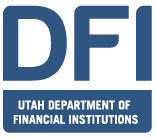Interest Rates
Utah law does not specify an interest rate ceiling, but does have an “unconscionability” provision (Section 70C-7-106 of the Utah Code). Rates are determined by the market; in other words, competition and demand determine the interest rate. Generally, the worse an applicant’s credit rating, the higher the interest rate charged, however some types of loans such as payday loans, post dated check loans, or “car title loans” tend to have very high interest rates whether the borrower’s credit is good or bad. If you have reasonably good credit, you are nearly always better off avoiding lenders who offer loans to people with bad credit.
In order for consumers to have a standard basis for comparing rates, the federal Truth in Lending Law (Regulation Z) requires disclosure of the interest rate charged as an Annual Percentage Rate (APR). We recommend that you make use of the information available to you and compare rates available to you prior to applying for a loan.
The table below illustrates the differences in monthly payments and total interest paid if $2,000 is borrowed at rates which are available in Utah:
|
$2,000 for |
||||
| Annual Percentage Rate | 7% | 14% | 36% | 120% |
| Monthly Payments | 89.55 | 96.03 | 118.09 | 222.60 |
| Total Interest Paid Over 2 Years | 149.20 | 304.72 | 834.16 | 3,342.40 |
